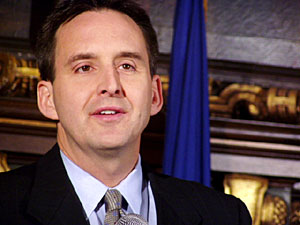Audio
Photos
More from MPR
Your Voice
| ||||||||||||||||||||||||||||||||||||||||||||||||||
Pawlenty steers clear of gambling, reserves in budget fix
March 4, 2004
Governor Tim Pawlenty has outlined plans for erasing a projected $160 million budget deficit this year. The proposal cuts funding for health care and higher education, but it boosts spending for certain key initiatives. Pawlenty steers clear of using gambling revenues to balance the books, but some critics say a proposal to accelerate certain tax collections comes dangerously close to a tax increase.
St. Paul, Minn. — Pawlenty has stressed repeatedly that this year's budget woes are light compared to the multi-billion dollar deficit lawmakers struggled with last session. Nonetheless, the governor acknowledges that erasing the $160 million shortfall will require some sacrifice. In his plan that sacrifice would come through reducing spending on subsidized health care, trimming the money available for college tuition aid, and an across-the-board three percent cut to state agencies.
But even as Pawlenty cuts with one hand, with the other he's proposing modest spending increases for K-12 education, National Guard soldiers, and, in particular, public safety.
 | |||
"You've got to address a number of needs simultaneously. And some trade-offs have to be made and some tough decisions have to be made. Public safety is one of the highest priorities of the services that government provides. One of the absolute highest priorities," he said.
Notably, the governor's plan doesn't use the state's $630 million budget reserve, but it does siphon funds from the Health Care Access Fund, which supports the MinnesotaCare health insurance program, and from an Iron Range economic development account.
Senate Democrats responded negatively. Majority Leader Dean Johnson of Willmar called the plan "mean-spirited," particularly for the health care reductions.
"The cuts to health care and to hospitals simply do not seem appropriate. That hurts the basic structure and fabric of what it is to live in Minnesota. And people expect a good health care system," Johnson said.
Johnson says Democrats will examine using the reserve fund, despite the possibility that could hurt the state's rating with credit agencies. Johnson did, however, praise the governor for staying clear of gambling money.
Many Republican lawmakers have urged the authorization of a new, privately-owned casino that diverts a portion of its revenues to state coffers. Pawlenty says he didn't want to act prematurely on gaming issues. Doing so, he says, could disrupt ongoing talks between his office and the state's Indian tribes which currently hold a monopoly on casino gaming.
Pawlenty has suggested that the tribes consider renegotiating their gaming compacts, which don't require revenue-sharing.
Republican House Majority Leader Erik Paulsen of Eden Prairie says his caucus will likely include gambling money.
"It's still in play. It's passed the House. It's got an ability to provide those funds right now. And I think you going to see a proposal come forward that re-emphasizes that," Paulsen said.
Paulsen, like Johnson, says House leadership is uncomfortable with some of Pawlenty's proposed health care reductions, particularly those that might affect nursing homes. Pawlenty says it's not surprising that the House, the Senate, and the administration aren't yet on the same page.
"I don't want to get ahead of ourselves, but I suspect you'll see the House move proactively on gaming, use that as a primary piece of their budget solution. I suspect the Senate will head towards the budget reserve. And we've got this proposal. And the three will collide together and we'll see what comes out of it," he said.
The final piece of Pawlenty's budget plan attempts to boost revenue collection. One initiative seeks greater compliance on cigarette tax payments. The other would require consumers who lease a car or truck to pay their entire sales tax up front at the time the lease is signed.
Currently, the tax is spread out over the life of the contract. Administration officials say the change is simply one of timing, and will have no net effect on consumers.
"That's what happens in a mathematician's world. That's not what happens when people really lease cares," said Scott Lambert, the executive vice president of the Minnesota Automobile Dealers Association. He says people lease cars precisely so they don't have to make a down payment. He says paying the entire tax at once will force them to seek a loan with interest.
"So Wells Fargo is going to pay the tax for you and you're going to pay Wells Fargo each month," he said.
Lambert says he considers tax change for car and truck leases to be a tax increase. Pawlenty, who has pledged not to raise taxes, made it clear that he believes it's no such thing.
KEY BUDGET CUTS AND SHIFTS
-$20 million taken from Higher Education Services Office surplus
-$40 million cut in care provider reimbursement rates
-3 percent reduction in state agencies' operating budgets, except small agencies and the Department of Corrections
-$50 million from requiring up-front payment of sales taxes on leased cars and changing the way cigarette taxes are collected
-$70 million from a surplus in the state's Health Care Access Fund, used to fund the state's health care program for the uninsured
-$6 million from a fund designed to help attract new businesses to the Iron Range
-$1.2 million of unclaimed lottery prize funds
KEY NEW FUNDING
-$12.6 million to improve programs for tracking and treating sexual predators
-$7.7 million to pay public defenders after the Supreme Court struck down mandatory fees for criminal defendents
-$2.6 million to merge state gang and drug task forces and provide more money for investigations
-$2.8 million for prisons
-$700,000 to lower the state's drunken driving threshold
-$800,000 for an anti-methamphetamine crackdown
-$1.3 million in re-enlistment bonuses for some National Guard members
-$1 million for 4-H programs
-$3.1 million for mandatory summer school for students who fail the basic skills test
-$4.5 million to improve rural telecommunications access
|
News Headlines
|
Related Subjects
|


